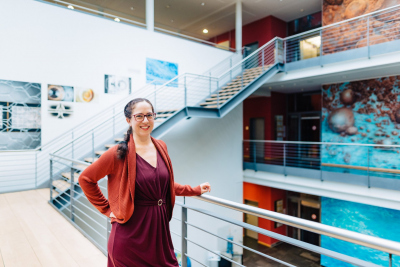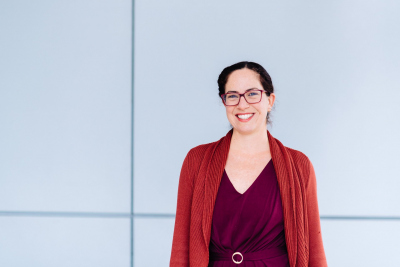- Home
- Alice Lefebvre
- Wissenschaft persönlich
Wissenschaft persönlich
I had the pleasure to answer the questions of "Wissenschaft persönlich", an initiative of Bremen invest, Bremen's economic development agency, to promote scientists and science communicators of Bremen and Bremerhaven. The full interview is available in German here and below is my free translation.

Dr. Alice Lefebvre is a researcher and teaching assistant at MARUM - Center for Marine Environmental Sciences at the University of Bremen. She is currently a postdoctoral researcher in the Cluster of Excellence "The Ocean Floor – Earth’s Uncharted Interface".
Bremen's science is excellent! And, of course, the many clever minds that bustle about in the laboratories and lecture halls have a considerable share in this. Who is behind the success of Bremen's science? In our portrait series Wissenschaft persönlich (Science in Person), scientists and science communicators regularly answer our questions - and reveal what they love about their work and why Bremen is just the right place for them.
In January 2021, Dr. Alice Lefebvre from MARUM - Center for Marine Environmental Sciences at the University of Bremen answered our questions. As a research associate, she conducts postdoctoral research in coastal dynamics. Through her teaching at the University of Bremen, she also introduces students to climate change and its impacts, especially on coasts. In addition, she is one of three women's representatives at MARUM.
Why we should pay more attention to sand, what Alice Lefebvre misses most in Bremen, and what "town musicians" of a special kind have to do with science in Bremen and Bremerhaven, you can find out here in the interview!
What would you have become if you had not become a scientist?
I think I would have become a STEM teacher. I really like the interaction with students and pupils. I enjoy communicating my love of science and being able to stimulate the students interest in the subject.
When do you find your job awesome? What moments make you feel enthusiastic?
Of course, it feels very good when a scientific article is accepted for publication or a project is funded. But these moments are very rare. What I really enjoy in my daily work is solving a mystery. I get an idea of how things might work. I look at my data, and it feels great when the data shows something interesting - even if it's not exactly what I expected.
Imagine you had a booth at the Freimarkt (Bremen yearly fair) and now had to explain to visitors what you were currently working on - what would your booth look like?
I would like to have several flumes to demonstrate the basics of sediment transport. These look like large aquariums - with sandy bottoms and water, but no fish! One of these flumes can represent a beach. A large paddle on the edge creates artificial waves whose size can be changed. As long as the waves are small, small beautiful dunes are created on the "seabed". As the size of the waves increases, for example if we simulate a storm, the sand moves more than with smaller waves, and the underwater dunes become larger and larger until they finally disappear. Now, if you also simulate the coast, you can demonstrate how salt marshes and mangroves can contribute to coastal protection. With another flume, i.e. aquarium, the transport of sand into the sea by rivers can be demonstrated, with the formation of river meanders and the deposition of sand in the sea which forms large deltas.
What is the social significance of your work and what are the benefits?
My work helps to understand how water and sand interact on the coast to create coastal landscapes. It's important to study this for many reasons, especially for coastal protection. The project I'm finishing is looking at the large dunes which develop at the bottom of rivers and oceans, how they move and interact with the water above them. For example, I have been looking at dunes in the Weser Estuary (river which flows through Bremen) right now, which are very common between Bremen and Bremerhaven. These dunes can be 1 to 3 metres high, so it is important to understand their dynamics for the safe navigation of ships.
When do you talk about progress in your work? Or to put it another way: how do you save the world?
I write scientific articles that can be used by engineers and authorities for a better management of the coastal zone. In my teaching, I am also very involved in making students aware of climate change and its impacts. Due to climate change and the associated rise in sea levels, the coasts are particularly at risk. I also try to make students aware of how humans are changing our planet through the reckless use of resources. For example, sand is one of the most important resources in modern society because concrete (and other materials) are made from it. And although entire beaches have already disappeared, sand has hardly received any attention so far.
Would you tell us your favourite working tool or your most important research method?
In the past, I worked a lot with data collected during ship expeditions or in flumes. Now I supplement what I have learned from these physical data with numerical modelling. This involves a computer calculating how water flows over dunes. I like that I can use different methods to study the same problem. Essentially, I spend relatively little time collecting a lot of data (during a ship expedition, in the lab, or with a numerical model). Afterwards, I spend a lot of time trying to decipher this large amount of data and gain new insights.
When and why did your path lead you to Bremen? And where did you come from?
I studied geology and oceanography in Bordeaux, in the south-west of France. During my master's degree, I went to Southampton, in the UK, as an Erasmus student and stayed there to do my PhD. After I defended my thesis, I wanted to look for a job in a sunny place, maybe Australia, because they also do a lot of coastal research there. I wanted to see a new country, and I was tired of the grey, mild English weather. Then I was offered a position at MARUM in the Cluster of Excellence. It was too good an opportunity to miss, considering the great research conditions at MARUM. So I came to Bremen on a grey and cold 3 October (German Reunification Day, public holiday), 11 years ago. I thought I would just do my two-year postdoc and then find a job in France. But I stayed. Bremen is a wonderful city, green and dynamic. The research environment is also great, so I am very happy that I stayed here.
What do you like about Bremen as a science location? What keeps you here?
MARUM is one of the leading institutes for marine environmental research, so it is a great opportunity to be able to work here. I also appreciate the support of the German Research Foundation, which does a great job at funding projects. The University of Bremen is a young, non-hierarchical university, which I like very much.
Is there anything you miss?
The long sandy beaches of the Atlantic coast of southern France, with its big waves and warm weather!!! And of course I miss my family, especially now in Corona time it is hard to live far away.
The distances in Bremen and Bremerhaven are short, as you know. How do you get around the city?
I always ride my bike. For the last 3 years I've been going back and forth with my 3 kids, two in the trailer and one with me on the bike. Now my biggest is in school, so I only ride two kids around, it feels so easy!
If you were to compare the science scene in the state of Bremen to an animal, which one would you choose and why?
Of course, everyone here knows the story of the Bremen Town Musicians. I worked for the graduate school GLOMAR for 5 years. Every year, the PhD days, a one or two days meetings for all the GLOMAR PhD students, were organised. The logo shows the Town Musicians, but with a dolphin instead of a donkey. I think this represents Bremen to me, the historical basis with a strong marine theme.
What was the biggest challenge you had to overcome in your scientific/professional career?
Combining my desire for a career with my desire for a large family. I was fortunate to have three children in three years, just as I had envisioned. But it was correspondingly hard to keep working when I hardly got any sleep for such a long time. I was also very frustrated that I had to stay home when one of the kids got sick and I had so much work to do. But of course, taking care of them is our priority. My partner is also very supportive, and we very much share the parenting duties. Still, it is difficult to have enough time for my career and my family.
Which ones are still ahead of you?
Now my biggest challenge is still to get a permanent job. I would say that job insecurity is the biggest downside of an academic career.
Do you have a personal formula for success?
It is important to stay curious and interested in everything, not just the very small thing we are researching at the moment.
From which failure have you learned the most?
When a research proposal is rejected. It's tough, but the reviews of the proposal help make it better and more relevant for the next time.
What do you do to clear your head?
Twice a week I go running during my lunch break. The university is ideally located for this, and I love running in the Blockland or Bürgerpark.
The next young scientist is moving to Bremen. What advice would you give him or her about where to live and go out in the evenings?
Of course, the Viertel (literally "the quarter", neighbourhood with lots of young people bars and restaurant) and its surroundings are a great place for young people moving to Bremen. I would also recommend moving into a shared flat. It helped me a lot to understand the German culture better and to settle in Bremen quickly.
Who would you want to introduce him/her to here in Bremen or Bremerhaven?
I would say it is important to build an extended network. At MARUM, we have many collaborations with departments at the university and other institutes in Bremen and Bremerhaven. It is good to go to all events where networking is possible to get to know many colleagues.
If you could swap your life for a day with someone from Bremen or Bremerhaven, whose life would you choose?
The teachers from our daycare centre. I would like to see how it feels to take care of 20 loud and active children all day long. I have great admiration for the work they do. I love the quiet in my office!

Dr. Alice Lefebvre
Year of birth
1982
Department / Field of research
MARUM - Center for Marine Environmental Sciences, University of Bremen / Coastal Dynamics
Current position / function
Postdoc, scientific assistant in research and teaching and one of three women's representatives at MARUM
Current activity / current research project
Postdoc in the Cluster of Excellence ›The Ocean Floor – Earth’s Uncharted Interface‹
Marital status
Partner and three children


